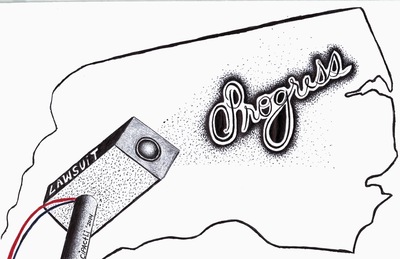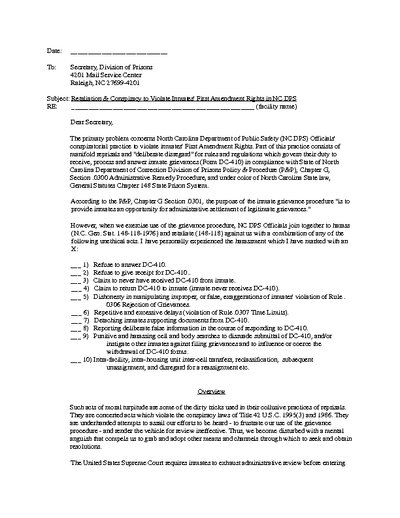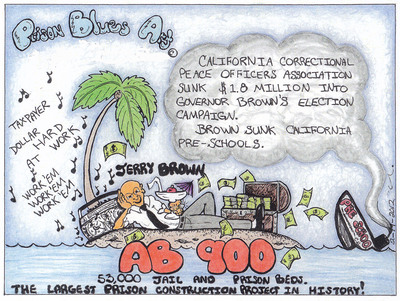“The tree of liberty must be refreshed from time to time with the blood
of patriots and tyrants.” - Thomas Jefferson
“Give me liberty or give me death.” - Thomas Pain
The above two quotes are admired citations that most Amerikans with any
educational degree deem to be master slogans this country’s freedoms are
based on. But these same quotes or those similar, if stated by Black men
or Black women, are deemed contraband and gang related.
On August 2, 2012 the 7th Circuit Court of Appeals handed down a
decision aimed at silencing and caging the spirit of the Panther. The
court ruled that the
ten
point platform that the Black Panther Party (BPP) cited in every
newspaper and later put forward as the core demands of the New Africans
in the Amerikan ghettos, is gang-related when found in the possession of
Black men. This decision was rendered from a case in one of the most
racist and oppressive prison systems in Amerika: Wisconsin DOC.
The 7th Circuit Court’s ruling in Tani Toston vs. Muchael Thurmer et
al, no# 10 cv 288 stated that Waupun prison officials in Wisconsin
could punish a Black man who allegedly has a tribal background (they
used the pejorative, “gang”) and who checked out two BPP books from the
prison’s own library, and purchased a 3rd book (To Die for the
People) and copied from all three the Panthers ten point platform.
The oppressors argued that these ten points were being used to construct
a gang structure simply because of the DOC’s slant that he had a tribal
background of defunct Gangster Disciples. They offered no evidence but
their ethnocentric opinions. They punished the prisoner and gave 90 days
segregation for learning Panther knowledge.
The plaintiff, who I call the Panther seeker, argued to the 7th Circuit
Court that the ten point platform could not be a gang related security
concern because the two books in the library recited the same program,
and prisoners are permitted to get the books and to buy them. They were
not on the state’s book ban list.
In opposing the Panther seeker and rationalizing their reactionary
measure, the prison defenders in the 7th Circuit stated: “…prison
librarians can not be required to read every word of every book to which
inmates might have access to make sure they contain no incendiary
material. There is no reason to think that a librarian or other employee
of the prison read cover to cover any of the three books that contain
the ten point program.”
Yet, they expect prisoners to know they could not write down the same,
though they did reverse and remand the due process claim that the prison
never told him he could not do so.
They further stated: “And even if the prison read the books and made a
determination the book was not gang lit. on whole, that does not
preclude disciplinary proceedings if an inmate copies incendiary
passings from it.”
It seems the court took issue with point #8 of the program, which calls
for “freedom for all Black men held (implicit also women) in federal,
state, county and city prisons and jails.” The court states the seeker
is Black and that the BPP were implicated in many acts of violence
including murder, and Huey himself may have killed a cop. Their source
is Hugh Pearsons The Shadow of the Panther: Huey Newton and the
Price of Black Power in America.(p. 145-46 1995). They also cited
the case People vs. Newton, 87 Cal. Rptr, 394 (CA), app. ct.
1970) and the case in which Black Panther leader Richard Moore was
convicted of assault in a shootout between Black Panthers and Oakland
police (Clener vs. Superior Court, 594 p.2d 984, 985-86 (Cal.
1979), In Re Cleaver, 72 Cal. Rptr. 20, 23-24 (Cal. App. Ct.
1968)).
They even went so far as to cite a coloring book as their source
research in coming to this ethnocentric ruling. “Black Panther coloring
books” depicting children murdering police, which were developed and
distributed under their own FBI’s COINTELPRO.
Then they had the disrespect to cite our beloved brother Fred Hampton’s
estate lawsuit which was filed after the Chicago pigs’ assassination of
the beloved. Hampton vs. Hanrahan 600 F. 2d 600, 654 (7th Cir.
1979) (dissenting opinion).
They wish to project they are fair. But how fair are they when they cite
all these biased cases and omit the fact that the police, FBI, and
others were actively seeking to destroy the BPP and even pacifists like
MLK, and these incidents were self-defense. The BPP was a self-defense
response to a racist system. How can you fault a people who stand up for
their human and constitutional rights and label them criminals for
defending the same principles this country was established on? The
answer is clear: what white leaders say, Black ones cannot say.
The court defended their ruling by saying: “The BPP is history. But the
ten point program could be thought by prison officials as an incitement
to violence by Black prisoners - especially since there is a new BPP
active today, which claims descent from the original. And like its
predecessor both advocates and practice violence.”(Citing: Southern
Poverty Law Center, New BPP).
They go on to cite disputing evidence to their conclusion by stating:
“In context, in the book of Huey’s writings, point #8 is much less
inflammatory than when read in isolation on the paper the plaintiff
wrote down and had in his foot locker.” They claim, in all three books,
there are explanatory commentary around each of the ten points and that
explanation is “innocuous” on point #8. “We believe that all black
people should be released from the many jails and prisons because they
have not received a fair and impartial trial.” (To Die for the
People. Bk. At. p5)
They seek to soften the blow of their ethnocentric cudgel: “…although
Newton’s book advocates revolution, it could no more be regarded as a
criminal incitement than the Communist Manifesto could be. But this
underscores the difference between a book as a whole and an arguably
inflammatory nugget plucked from it.” So what say they if we cite Thomas
Pains “give me liberty or give me death”? Same as Huey’s statement in
point #8.
The court went on to justify their favoritism to a ethnocentric/racist
prison by stating: “Not being experts in prison administration, but
aware of the security problems in American prisons, judges sensibly
defer within broad limits to the judgements of the prison
administration.”
How can the court make a fair ruling if they don’t acquire some
expertise in prison administration? That is the court’s job as
arbitrators of the case. We as prisoners need to present evidence on the
expert level of how prison administrators exaggerate the facts and cite
spookisms in their affidavits and summary judgement motions. As
prisoners we are and should be experts in prison administration
operation and the lies they tell. So why are we not illustrating the
same in our litigation.
On the question of the “security problems in american prisons,” again,
these perceptions are all based upon what the prison officials report
and claim; hardly a fair assessment as to what is really going on. This
is possible because we are not disputing and putting the truth out
there. We are not uniting and pooling our resources to fight the lies
the prison system puts out.
The Beard vs. Banks case illustrates this fact. The
lawyers/prisoners did not submit anything disputing the alleged facts in
the defendant/prison official’s summary judgement motion. As such, the
court accepted all their exaggerations as true. Though they probably
would have accepted the prison exaggerations anyway, we cannot make it
so easy or allow them to justify it without exposing their favoritism
and bias. The fact is that this case had lawyers, so the court could
have given the disputes more weight than pro se disputed facts.
This is the litigation war we are engaged in. No capitulations allowed.
The Van den Bosch case shows how censorship is allowed when we write
articles like this one here. There, an article on how Wisconsin is #1 in
creating conditions in segregation for petty stuff and these conditions
leading to what I call intentional conditions for “suggestive ideation”
(suicide). The court accepted the Wisconsin prison administrator’s
exaggerated security claim that criticizing these conditions could be
viewed as incitement because people were killing themselves and the
article stated officials were to blame. We cannot even complain or
express our opinions.
We see how the court forgets that the BPP was attacked by the pigs and
FBI, and they also forget all the cases in which the prison
administrations have been proven busted and exposed for presenting lies.
However, I stress again, it is our job to present such overwhelming
facts/evidence to not allow the courts to easily accept the judgements
and defer to the prisons, because we know they are straight up liars.
This is war in facts.
This fact is shown by what the court wrote: “The nexus between
plaintiffs copying the ten point program from”To Die for the People” and
gang activity may seem tenuous, but the defendants argue that the
likeliest reason the plaintiff copied the ten point program was to show
it to inmates whom he hoped to enlist in a prison gang, a local cell as
it were of the Black Panthers, the ten point program would be the gang’s
charter”. They go on to say “this is merely a supposition, but it is not
so implausible that we can dismiss as groundless the prisons concern.”
They support that racist logic on the affidavit submitted by the
prison’s so-called gang coordinator, a racist named Bruce Muranski, who
has been discredited in at least one case as possibly manufacturing
so-called informant statements. “In the U.S. the main organizations that
monitor intolerance and hate groups are the Anti-Defamation League (ADL)
and the Southern Poverty Law Center (SPLC) have deemed the new BPP as a
hate group… there would be no other purpose…in the ten point program
other than recruiting group members and establishing, reinforcing and
maintaining an organizational structure for furthering gangs…”
In another part of the affidavit Muranski claims: “isolating the ten
point from these library books allows it to be taken out of context,
easily circulated and simultaneously possessed by gang members and
changed or adopted for the specific needs and activities of the group…
(another prisoner, other than plaintiff) was alleged to have
unsanctioned security threat group items in his cell…(including) a hand
written paper titled ‘notes on African American leaders’. This sheet of
paper contained the ten point which was identical in content to the ten
point found in plaintiff cell…”
There we have it. All Black leaders who were willing to say in their own
words or actions “give me liberty or give me death” are deemed
contraband. Yet, I can have all the quotes I wish of white
revolutionaries and Amerikan founding fathers. White “inciteful”
language against the British crown is protected expression while George
Jackson, or a Hoover or Malik, or Huey Newton is contraband.
The fact is that damn near every BPP or associated case, in law books or
on the computer, has the same ten point program in it. So all we would
need to do is buy a Panther case and circulate it if we wanted to share
the ten point program. We see this decision is about intimidation and
instilling inferiority. For even the cases the court cited have the ten
points in them. Surely they knew that.
Still more, the case in which they made this racist ruling itself can
now be used to promote and propagate the ten point program. So it’s
clear: the prison has no lawful reason to exclude the ten points even if
they subsequently ban the books, which I’m sure they might try. The
ruling is a joke and more about suppression and control.
MIM(Prisons) adds: While it is a set back for revolutionaries
when important historical literature is banned or access limited to
sharing this literature, it is something of a public admission of the
strength and value of the
Black
Panther Party political line that this court felt the need to decree
it as gang material. Prisoners who are labeled as part of a “Security
Threat Group” are often actually organizing for the betterment of
oppressed people, and promoting the peace and security of prisoners.
This exposes the lie of the prison’s claim that they want security. The
only security prisons promote is job security for the guards and other
prison workers. Prisoners’ lives are far from safe and secure, due to
conditions created by the guards and the criminal injustice system in
general.











